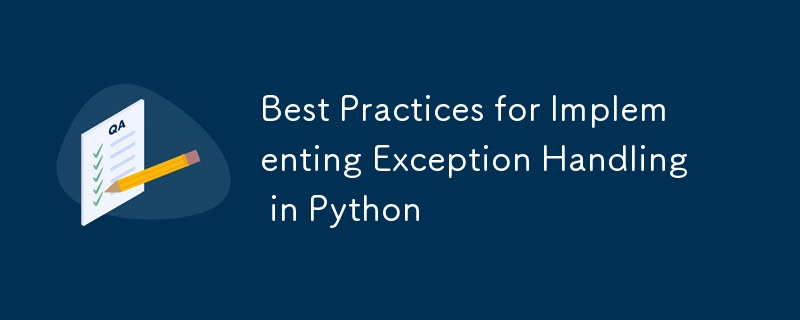在 Python 中实现异常处理的最佳实践
- PHPz原创
- 2024-08-27 06:07:02829浏览

编写有效的异常处理代码对于创建健壮且可维护的应用程序至关重要。
以下是在 Python 中编写异常处理代码的一些最佳实践:
1. 只捕捉你能处理的东西
具体:
- 捕获特定的异常,而不是使用广泛的 except 子句。
- 这确保了只有您期望并知道如何处理的异常才会被捕获。
try:
# Code that might raise an exception
except ValueError as e:
print(f"Value error occurred: {e}")
2. 避免使用 Bare except: 子句
捕获特定异常:
- 避免使用 except: 而不指定异常类型。
- 这可能会捕获意外错误并使调试变得困难。
try:
# Code that might raise an exception
except Exception as e: # Catch all exceptions if necessary
print(f"An error occurred: {e}")
3. 使用 try- except-else-finally 块
- try:将可能引发异常的代码放在这里。
- except:处理该块中的异常。
- else: 如果 try 块中没有引发异常,则执行此块。
- finally:无论是否引发异常都执行此块,通常用于清理。
try:
# Code that might raise an exception
except ValueError as e:
print(f"Value error: {e}")
else:
print("No exceptions occurred.")
finally:
print("This will always be executed.")
4. 记录异常
- 使用日志模块记录异常。
- 日志记录有助于诊断生产中的问题,而不会向最终用户透露错误。
import logging
logging.basicConfig(level=logging.ERROR)
try:
# Code that might raise an exception
except Exception as e:
logging.error(f"An error occurred: {e}")
5. 必要时重新提出异常
- 如果您捕获异常但无法完全处理它,请考虑重新引发它,以便可以在其他地方处理它。
try:
# Code that might raise an exception
except ValueError as e:
logging.error(f"Value error: {e}")
raise # Re-raise the exception
6. 使用上下文管理器进行资源管理
- 使用上下文管理器(带有语句)来管理文件、套接字或数据库连接等资源。
- 这可以确保即使引发异常也能正确释放资源。
with open('file.txt', 'r') as file:
content = file.read()
7. 优雅降级
-不要让您的应用程序崩溃,而是提供回退机制或用户友好的错误消息。
- 例如,如果配置文件丢失,您可以使用默认设置。
try:
with open('config.json', 'r') as file:
config = json.load(file)
except FileNotFoundError:
print("Config file not found, using defaults.")
config = {"default": "value"}
8.避免吞咽异常
- 不要在不采取任何行动的情况下捕获异常。
- 忽略异常可能会隐藏错误并使应用程序行为不可预测。
try:
# Code that might raise an exception
except Exception as e:
pass # Bad practice - you're ignoring the error
9. 记录例外情况
- 使用文档字符串来记录函数可能引发的异常。
- 这可以帮助其他开发人员了解会出现哪些异常以及如何处理它们。
def divide(a, b):
"""
Divides two numbers.
:param a: Numerator.
:param b: Denominator.
:return: The result of the division.
:raises ZeroDivisionError: If the denominator is zero.
"""
if b == 0:
raise ZeroDivisionError("Cannot divide by zero.")
return a / b
10. 适当时使用自定义异常
- 创建自定义异常来表示应用程序中的特定错误条件。
- 这可以使您的代码更具可读性且更易于维护。
class InvalidInputError(Exception):
"""Exception raised for invalid inputs."""
pass
def process_input(value):
if not isinstance(value, int):
raise InvalidInputError("Input must be an integer.")
return value * 2
11. 测试异常处理
- 编写测试以确保您的异常处理按预期工作。
- 使用unittest或pytest等框架来测试正常情况和异常情况。
def test_divide():
assert divide(10, 2) == 5
with pytest.raises(ZeroDivisionError):
divide(10, 0)
12.避免过度使用异常
对特殊情况使用例外:
- 异常应该用于意外情况,而不是作为常规的控制流机制。
- 例如,避免使用异常来处理可预测的条件,例如循环结束。
# Bad practice: using exceptions for control flow
try:
while True:
value = next(iterator)
except StopIteration:
pass # End of iteration
13. 上下文的连锁异常
- Python 允许您在引发新异常时链接异常以保留原始上下文。
- 使用 from 链接相关异常。
try:
result = process_input(input_value)
except InvalidInputError as e:
raise ValueError("Failed to process input") from e
通过遵循这些最佳实践,您可以编写更健壮、可维护且可读的异常处理代码,从而优雅地管理错误并增强应用程序的可靠性。
资源
- Python 关于异常处理的官方文档
- Python 的日志记录模块文档
- PEP 8 - Python 代码风格指南(适用于包括例外在内的一般编码实践)
- 真正的 Python - 异常处理
以上是在 Python 中实现异常处理的最佳实践的详细内容。更多信息请关注PHP中文网其他相关文章!
声明:
本文内容由网友自发贡献,版权归原作者所有,本站不承担相应法律责任。如您发现有涉嫌抄袭侵权的内容,请联系admin@php.cn

